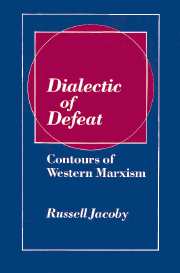Book contents
- Frontmatter
- Contents
- Preface
- Introduction
- Chapter 1 Conformist Marxism
- Chapter 2 The Marxism of Hegel and Engels
- Chapter 3 From philosophy to politics: the inception of Western Marxism I
- Chapter 4 From politics to philosophy: the inception of Western Marxism II
- Chapter 5 The subterranean years
- Chapter 6 Class unconsciousness
- Journal abbreviations used in notes
- Notes
- Index
Chapter 3 - From philosophy to politics: the inception of Western Marxism I
Published online by Cambridge University Press: 04 August 2010
- Frontmatter
- Contents
- Preface
- Introduction
- Chapter 1 Conformist Marxism
- Chapter 2 The Marxism of Hegel and Engels
- Chapter 3 From philosophy to politics: the inception of Western Marxism I
- Chapter 4 From politics to philosophy: the inception of Western Marxism II
- Chapter 5 The subterranean years
- Chapter 6 Class unconsciousness
- Journal abbreviations used in notes
- Notes
- Index
Summary
The term “Western Marxism” (and “European Marxism”) entered Marxist dictionaries in the early 1920s. The Soviet edition listed it as derogatory. By implying that a specific Marxism belonged to Western Europe, the universality of bolshevism and the III (Communist) International (Comintern) was threatened. To the participants, this threat was not instantly evident. Moreover, the political and philosophical layers of Western Marxism unpeeled sequentially; at least this is how it appeared to Korsch when he looked back. First a specific Western Marxist politics took shape, and later its philosophy was elaborated.
“As it moved westwards,” Korsch explained in 1930, “this Marxist Leninist philosophy [of the Russians] encountered the work of Lukács, myself and other ‘Western’ Communists which formed an antagonistic philosophical tendency within the Communist International itself.” He added: “This philosophical discussion was only a weak echo of the political and tactical disputes that the two sides had conducted so fiercely some years before.” Of these political disputes, Korsch mentioned two: Rosa Luxemburg's criticism of the Russian Revolution and the conflict between the Bolsheviks and the “radical left tendency” led by the Dutchmen Anton Pannekoek and Hermann Gorter.
A “weak echo”: World War I, the collapse of the II International, the radicalization of the working class, the Russian Revolution, brief Western European revolutions, the founding of the III International and the new Communist parties resonated for decades. The magnitude and profundity of these upheavals damned philosophical discussions to irrelevancy. By 1923, however, when Korsch and Lukács published their major philosophical works, the revolutionary surges had subsided. Politics lost an immediacy, or, at least, the options contracted. This was not only hindsight.
- Type
- Chapter
- Information
- Dialectic of DefeatContours of Western Marxism, pp. 59 - 82Publisher: Cambridge University PressPrint publication year: 1981

